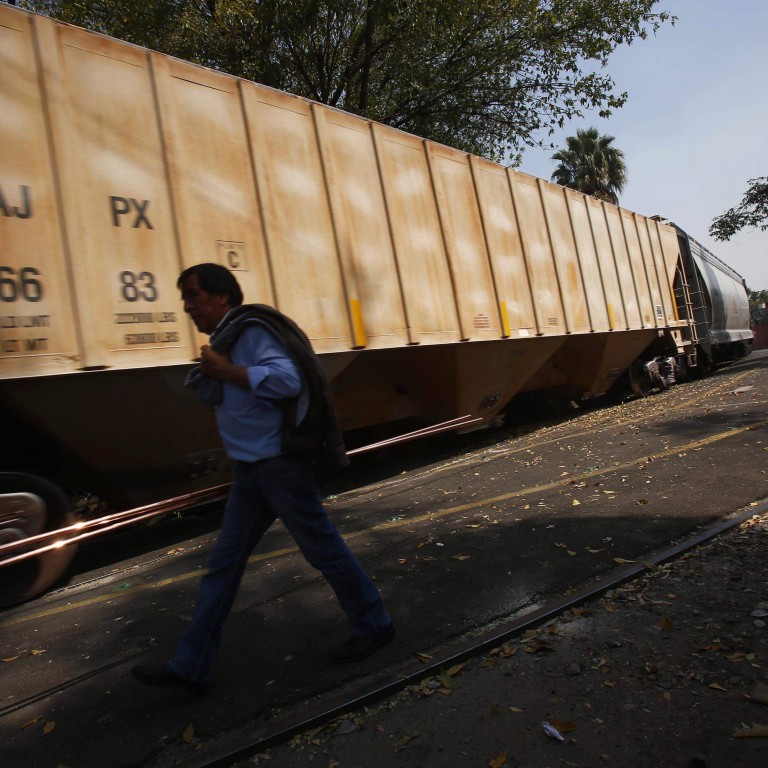
Chinese companies must learn to price the risks accurately when 'going out'
Hu Shuli says the cancellation of CRCC's railway contract in Mexico underscores a flaw common to firms that rely too much on state favour
Just as news of the abrupt cancellation of China Railway Construction Corporation's (CRCC) contract in Mexico was beginning to die down, China's Silk Road project, highlighted at the recent Apec meeting, again turned the global spotlight on the nation's involvement in overseas development projects, which some have dubbed China's Marshall Plan.
It's worth reviewing CRCC's setback in Mexico. Early last month, the Mexican government said it was scrapping the CRCC-led bid for a railway project, just days after awarding it the contract, sparking outrage in China. But what led to Mexico's about-turn isn't difficult to understand. In August, its government opened bidding on a project to build the country's first high-speed rail, but gave companies only two months to submit a tender, in an effort to complete the project by the end of President Pena Nieto's term in 2017.
The industry giants that initially expressed an interest, including France's Alstom, Canada's Bombadier and Germany's Siemens, dropped out when they could not meet the deadline. A consortium of CRCC and four Mexican construction companies became the sole bidder.
On November 3, the government awarded the consortium the contract. But soon after, Mexican opposition politicians raised concerns about the transparency of the tender process, and reports emerged that one Mexican partner in the deal had links to the president's family. To avoid further controversy, President Nieto announced on November 7 that he was pulling the deal.
We should note, however, that both sides had yet to sign a formal contract. It's common enough for business deals to fall through at this stage. But the cancellation touched a nerve in China because the contract was seen by many as the first major success of a Chinese railway giant that had "gone out".
Effective risk management is needed to facilitate Chinese investment abroad. This means companies must conduct thorough checks before committing to any deals. One major factor would be hidden political risks: can decision-makers be trusted? To what degree can opposition politicians or interest groups obstruct progress? Are the local partners reliable?
There are those who say such thorough investigations are currently beyond the expertise of Chinese companies, which, after all, lack experience in the global market. But this is the price of success.
We should ask: if CRCC could put together its bid for the project with a 400-member team working 24 hours a day, why couldn't the other multinational companies that were just as keen on the job do the same? Sadly, the answer isn't because Chinese people were more hardworking; more likely, these other companies were more stringent in their risk assessment and less willing to expose themselves to unjustifiable risks.
This underestimation of risks explains why Chinese companies regularly outbid their competitors on price. This is partly due to complacency. Most Chinese companies that "go out" are state-owned giants that assume the Chinese foreign service will watch over them, ready to bail them out when trouble strikes. It's no wonder that, despite the companies' hard work to present an "all business" image overseas, many outsiders continue to read all kinds of political intent into Chinese commercial activities.
Apart from the political risks, Chinese companies also ought to weigh carefully the commercial risks. Take the Mexican project to build a high-speed rail line connecting Mexico City and Querétaro in central Mexico. The railway line is about 100km longer than the Beijing-Tianjin line, yet the construction budget is lower. Looking at the numbers, some analysts even projected CRCC would make a loss on the project. Yet such worries don't appear to have dented CRCC's ambition.
Chinese companies and investment are being pushed to "go out" because of three major reasons. One, China has accumulated enormous foreign exchange reserves that have to be invested in channels other than American government debt. Two, Chinese industry suffers from excess capacity, which could profitably serve global markets. Three, the managers of state-owned giants are eager to make their mark on the global stage to earn political brownie points.
It's too easy to mishandle this desire to "go out". Recall the major deals involving Chinese companies that were scuppered at the last minute.
For the "going out" policy to succeed, the Chinese government must do its best to protect the companies' legal rights, but in the marketplace, it must take a back seat to allow the companies themselves to assess risks more seriously.
Business should be guided by commercial logic. State-owned companies that overly rely on their "parent's love" will never grow up. The market should play a decisive role in the Chinese economy, and this applies to Chinese companies that have "gone out".

